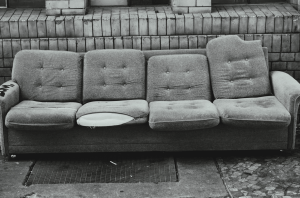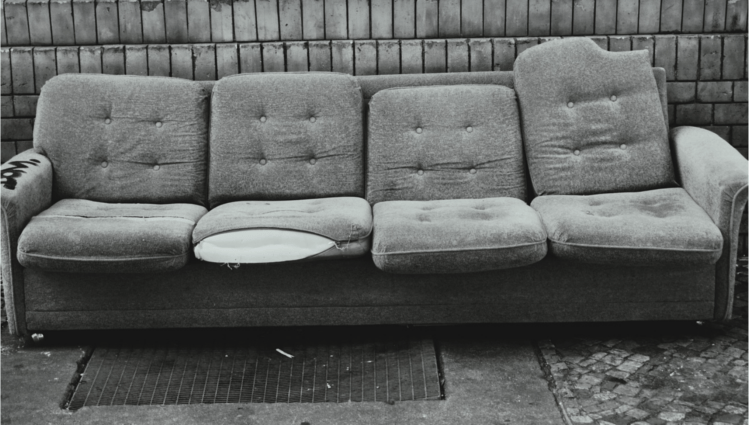Because life often comes at you very fast, the cleaning of a khaki couch, like the cleansing of Augean stables, is a task that often waits for a hero’s journey. Or at least a lot of free time. This trembling period of early Covid insanity was one such time in which I felt both impulses. Thus, I had embarked on it and found that there was much more in this couch than I could have ever guessed.
To see a World in a Grain of Sand
and a Heaven in a Wild Flower
Hold Infinity in the palm of your hand
and Eternity in an hour.
–William Blake, “Auguries of Innocence”
 Looking through a book this Christmas, I found part of an old envelope. On it was an extensive list of household items. The list was not dated, but I know it came from the late winter of 2020, when, in the name of Covid, churches, schools, and mostly small businesses were being shuttered while liquor stores and large corporations with well-staffed legal teams were allowed to keep making their profits. We had not yet been subjected to useless masks or to the demand that we take unproven, emergency-authorized pharmaceuticals or lose our jobs. But we had been told to “shelter in place,” as if a respiratory disease were like a tornado or perhaps an angel of death haunting the streets.
Looking through a book this Christmas, I found part of an old envelope. On it was an extensive list of household items. The list was not dated, but I know it came from the late winter of 2020, when, in the name of Covid, churches, schools, and mostly small businesses were being shuttered while liquor stores and large corporations with well-staffed legal teams were allowed to keep making their profits. We had not yet been subjected to useless masks or to the demand that we take unproven, emergency-authorized pharmaceuticals or lose our jobs. But we had been told to “shelter in place,” as if a respiratory disease were like a tornado or perhaps an angel of death haunting the streets.
There was still the hope that sanity would prevail. Though it didn’t, we were still at the point when we could enjoy the time at home as what it seemed then, a set of quasi-snow days. It was then that we attempted a task that had been crying out for doing for some time: the cleaning out of our big khaki couch that we had owned for nearly a decade.
It was, like most of our furniture, a hand-me-down. A very large specimen, it had been sitting in our friends’ garage for a couple years since it couldn’t fit through any of their doors. They finally asked around, and we had gratefully accepted. Because of its size, it was the kind of couch that a normal-sized man could sleep on without danger of rolling off. A child could feel fully comfortable on it. Because of these qualities and because my children kept making forts out of its large cushions and hiding under them, it developed some rips underneath those overstuffed cushions. Eventually, we realized, this battered and beaten vessel of lounging was carrying cargo underneath the seats.
But because life often comes at you very fast, the cleaning of a khaki couch, like the cleansing of Augean stables, is a task that often waits for a hero’s journey. Or at least a lot of free time. This trembling period of early Covid insanity was one such time in which I felt both impulses. Thus, I had embarked on it and found that there was much more in this couch than I could have ever guessed.
What I found was that this was a more delightful task than I had thought it would be. Though I didn’t have it in my conscious mind at the time, I’m sure that Chesterton’s chapter “The Ethics of Elfland” had influenced me. It was there that Chesterton had described his “feelings of cosmic coziness,” which he illustrated with reference to Robinson Crusoe.
Crusoe is a man on a small rock with a few comforts just snatched from the sea: the best thing in the book is simply the list of things saved from the wreck. The greatest of poems is an inventory. Every kitchen tool becomes ideal because Crusoe might have dropped it in the sea. It is a good exercise, in empty or ugly hours of the day, to look at anything, the coal-scuttle or the book-case, and think how happy one could be to have brought it out of the sinking ship on to the solitary island. But it is a better exercise still to remember how all things have had this hair-breadth escape: everything has been saved from a wreck.
There was no doubt that I too felt the poetry of my own inventory, for I wrote it down in this order:
Comb
Working flashlight
Library book that we had paid for
Other books
Toy soldiers (the little green ones)
11 cents
6 matchbox cars
A foot and a half of toy train track
Plastic fork and spoon
3 calculators
2 sets of pliers (1 needle-nose)
Pencils and colored pencils of all sorts
Notes on one of Newman’s Anglican sermons
September 2019 issue of The New Criterion
An entire couch cushion
Sunglasses with “Party Like it’s 1776” on the side
3-D glasses from the Mann theater
Rubber ball
Grip strength tool
Lion hand puppet
Little American flag
Baby shoe
Remote controls
2 deodorant sticks
Part of a Rosary
A wall cross
Socks (multiple)
Air pump with needle
A right mitten
Barrette
Like Crusoe, there was a great sense of relief and gratefulness for the providence bestowed to us in this wrecked ship of a couch. True, we had deodorant, but two more would be used. The same with a barrette, a comb, and the pencils. If not scarce items, they were useful. The sunglasses were not needed at that moment, but I never keep a pair long before sitting on them in my car. One can always use more change. Nor can, like good whiskey, there be a limit on matchbox cars.
Other discoveries had more the feeling of triumph and that sense of having been saved out of a shipwreck. We had three calculators, like the three crosses dug up by St. Helena, and they appeared just in time for an extended period of “distance learning.” We bowed to all, thinking them all the true calculators of the one who said, “Count the cost.”
So too for many others. An air pump and needle are never there when one needs them. Lo, they appeared! That grip strength exerciser—I’ve lost it again at the moment—it was right under me so many times I looked for it. Other flashlights there may have been in the house, but this one was the only one whose whereabouts we actually knew at the moment. And though there was at least one pair of pliers in the toolbox, the finding of the needle-nose pliers was a little amazing grace: they once were lost but now were found.
Other items evoked a less utilitarian sense of wonder. Those notes on the Newman sermon, the copy of The New Criterion… nothing is so tantalizing to a reader as a hidden or forgotten document. That there was patriotic kitsch and religious art was itself comforting. Our country and the Church, both failing and seemingly going into eclipse in so many ways, were still there, ready with their riches to be discovered by a new generation.
Other mysteries were seemingly deeper. Missing socks and the right mitten had previously been believed to have disappeared into another dimension where dwelt missing Tupperware lids and containers (never, naturally, matching). The finding of such things was like the finding of a portkey or a portal to an unseen world. Of course, this led us to ponder what else was missing. Where were those Tupperware lids? Why had we not discovered any financial papers that would forever solve our money problems? Or at least a map to buried treasure? Why had we not discovered Jimmy Hoffa down there in the bowels of this sofa? It would have explained why the thing was so heavy.
In the end, however, any wondering about what was not in it was eclipsed by pondering what we had found: a time capsule containing samples from the last decade of our lives. It was indeed all the things that Chesterton had seen in Crusoe’s treasure: romance, poetry, treasure, and tools. And in it we too saw the greatness of God’s gift to us in the midst of what the novelist Kazantzakis called the “full catastrophe” of family life and the approaching catastrophe of public officials who would ruin many lives in the name of health.
We had seen a world in the bowels of a couch. It was our world, ridiculous and precious all at the same time. A world forged in time but that would, we pray, echo in eternity where the God who dwells beyond all time brings all times together.
The Imaginative Conservative applies the principle of appreciation to the discussion of culture and politics—we approach dialogue with magnanimity rather than with mere civility. Will you help us remain a refreshing oasis in the increasingly contentious arena of modern discourse? Please consider donating now.
The featured image is courtesy of Pixabay.


